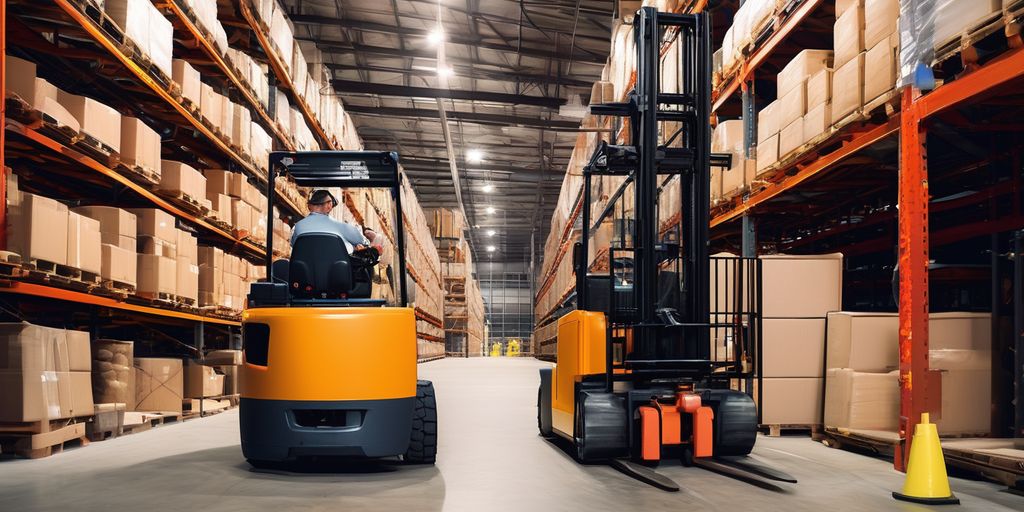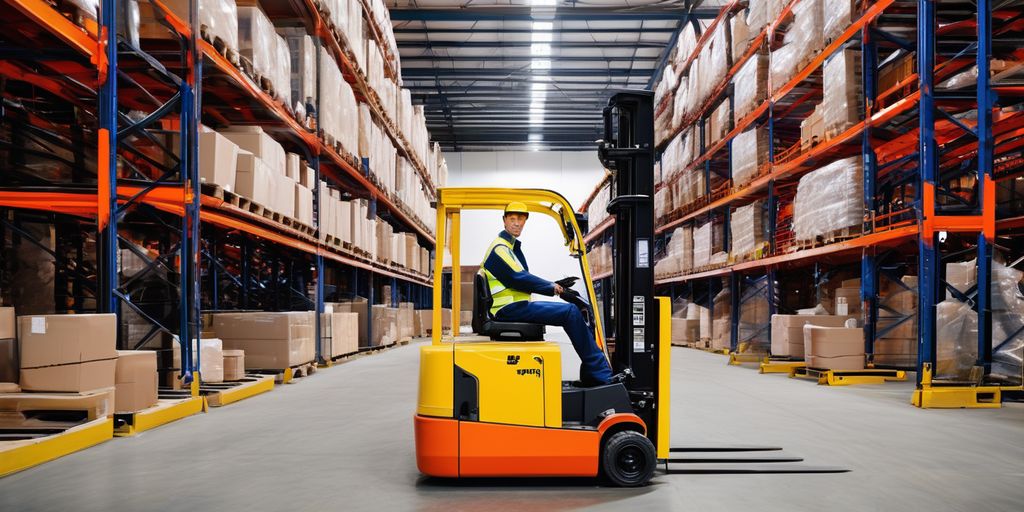Choosing the right fork truck forks for your warehouse can be a challenging task. This ultimate guide will help you navigate through the different types of forks available, the key factors to consider when making your selection, and the role these forks play in enhancing warehouse efficiency. Additionally, we will provide maintenance tips, explore innovative technologies, and offer safety guidelines to ensure you make an informed decision.
Key Takeaways
- Understand the different types of fork truck forks and their specific uses.
- Consider key factors such as load capacity, fork length and width, and material durability when choosing forks.
- Proper maintenance, including regular inspections and timely replacements, is crucial for fork longevity and safety.
- Innovative technologies like smart forks and adjustable forks can enhance warehouse efficiency.
- Always follow safety guidelines to ensure correct fork positioning, load balancing, and operator training.
Understanding Different Types of Fork Truck Forks
Fork truck forks come in various types, each designed to meet specific needs in a warehouse setting. Choosing the right type of fork is crucial for optimizing your warehouse operations and ensuring safety.
Standard Forks
Standard forks are the most commonly used type in warehouses. They are versatile and can handle a wide range of loads. These forks are typically used with counterbalance forklifts and are suitable for general-purpose tasks.
Pallet Forks
Pallet forks are specifically designed for handling palletized goods. They are often used with reach trucks, which have an extended reach capability, allowing them to access deep shelving units. This makes them ideal for narrow aisles and high-reach applications.
Specialty Forks
Specialty forks are designed for unique applications and can include custom and large lift truck forks, including models with capacities up to 150 tons. These forks are tailored to meet specific industry needs and can be equipped with various attachments for specialized tasks.
Key Factors to Consider When Choosing Fork Truck Forks
When selecting the right fork truck forks for your warehouse, several key factors must be taken into account to ensure optimal performance and safety. Considering these factors will help you make an informed decision that meets your specific requirements.
The Role of Fork Truck Forks in Warehouse Efficiency
Fork truck forks play a crucial role in enhancing warehouse efficiency by optimizing load handling, reducing damage and wear, and improving safety. Maximizing efficiency in forklift fleet management involves analyzing requirements, leveraging data, enhancing training, scheduling maintenance, and optimizing facility layout for peak performance.
Optimizing Load Handling
Fork truck forks are designed to handle various types of loads, making it easier to move goods and reduce the need for manual labor. This not only speeds up operations but also ensures that goods are handled safely and efficiently.
Reducing Damage and Wear
Using the right type of fork truck forks can significantly reduce damage to both the goods and the equipment. This is particularly important in high-density storage facilities where space optimization is crucial. Reach fork trucks, for example, are designed to handle pallets in narrow aisles, maximizing storage space.
Improving Safety
Safety is a paramount concern in any warehouse operation. Properly maintained and correctly used fork truck forks can greatly enhance safety by ensuring that loads are balanced and securely held. This reduces the risk of accidents and injuries, making the warehouse a safer place to work.
The value of forklifts in warehouse operations cannot be overstated. They make it easier to move goods, reduce the need for manual labor, and enhance overall efficiency.
Maintenance Tips for Fork Truck Forks

Regular Inspections
Perform thorough visual inspections of the forklift, checking for any signs of wear and tear, fluid leaks, or loose parts. Inspecting the forks of your forklift is critical for ensuring operational safety and efficiency. Look closely for any visible cracks or damage, particularly at the heels and tips of the forks.
Proper Cleaning Techniques
Regular cleaning of the forks helps to prevent the buildup of debris and contaminants that can cause damage over time. Use appropriate cleaning agents and tools to ensure that the forks are kept in good condition.
Timely Replacements
Replace worn-out or damaged forks promptly to avoid compromising the safety and efficiency of your forklift operations. Neglecting regular maintenance can lead to mechanical failures in forklifts, and may result in downtime or incidents. Implementing a maintenance schedule can help in identifying when replacements are necessary.
Regularly scheduled maintenance helps identify potential issues before they escalate into major problems.
Innovative Technologies in Fork Truck Forks
Smart Forks
Smart forks are revolutionizing the material handling industry by integrating advanced sensors and IoT technology. These forks can provide real-time data on load weight, balance, and positioning, enhancing efficiency and safety in the warehouse. By embracing automation and advanced safety systems, businesses can stay competitive in the evolving market.
Adjustable Forks
Adjustable forks offer flexibility in handling various load sizes and types. They can be easily modified to fit different pallet dimensions, reducing the need for multiple fork sets. This adaptability is crucial for optimizing load handling and improving overall warehouse efficiency.
High-Strength Materials
The use of high-strength materials in fork truck forks ensures durability and longevity. These materials can withstand heavy loads and harsh conditions, reducing the frequency of replacements and maintenance. This innovation is key to maintaining a competitive edge in the industry.
Choosing the right forklift: key considerations for your business needs. Embrace automation and advanced safety systems for efficiency, safety, and competitiveness in the evolving market.
How to Match Fork Truck Forks to Your Specific Needs
Choosing the right fork truck forks for your warehouse is crucial for optimizing efficiency and safety. Understanding your specific needs will help you make an informed decision.
Assessing Warehouse Requirements
Start by evaluating the unique requirements of your warehouse. Consider factors such as the types of goods you handle, the layout of your storage areas, and the typical weight and dimensions of your loads. This assessment will guide you in selecting the most suitable fork truck forks.
Consulting with Experts
Engage with industry experts to gain insights into the best fork truck forks for your needs. They can provide valuable advice on the latest technologies and trends, helping you make a well-informed decision.
Custom Fork Solutions
In some cases, standard forks may not meet your specific requirements. Custom fork solutions can be designed to address unique challenges, ensuring optimal performance and safety in your warehouse.
By understanding your specific application requirements, you can select a forklift that is optimized for the tasks at hand.
Safety Guidelines for Using Fork Truck Forks
Correct Fork Positioning
Proper fork positioning is crucial for maintaining balance and stability during operations. Always ensure the forks are evenly spaced and fully inserted under the load to prevent tipping or falling objects. This practice helps in keeping the load stable and centered on the forks.
Load Balancing
Load balancing is essential to avoid accidents and ensure smooth operations. Follow these best practices:
- Keep the load stable and centered on the forks.
- Avoid sharp turns and sudden stops.
- Use proper load securement methods, such as straps or appropriate attachments.
Operator Training
Operator training is a key factor in maintaining safety standards. Ensure all operators are trained and certified according to OSHA's regulation. Training should cover:
- Safe operation techniques
- Load handling procedures
- Emergency protocols
Safety should always be a top priority. Ensure the forklift has features like backup alarms, clear visibility, and a stable design to prevent tipping.
Regular training and adherence to safety guidelines can significantly reduce the risk of accidents and improve overall warehouse efficiency.
Conclusion
Choosing the right forklift forks for your warehouse is a critical decision that impacts the efficiency and safety of your operations. This guide has provided you with a comprehensive overview of the key factors to consider, from understanding your specific needs to evaluating the latest features and technologies. By following the steps outlined, you can make an informed decision that will enhance your material handling processes and contribute to the overall success of your business. Remember, the right equipment not only improves productivity but also ensures the safety and well-being of your operators. Invest wisely and reap the benefits of a well-organized and efficient warehouse.
Frequently Asked Questions
What are the different types of fork truck forks available?
There are several types of fork truck forks, including standard forks, pallet forks, and specialty forks. Each type is designed for specific tasks and load types.
How do I determine the load capacity for fork truck forks?
The load capacity of fork truck forks should be determined based on the maximum weight of the loads you will be handling. Always refer to the manufacturer’s specifications and guidelines.
What factors should I consider when choosing the length and width of fork truck forks?
Consider the size and type of loads you will be handling, as well as the dimensions of your warehouse aisles. The length and width of the forks should match your specific operational needs.
Why is material and durability important for fork truck forks?
Material and durability are crucial because they determine the longevity and performance of the forks. High-quality materials ensure that the forks can withstand heavy use and harsh conditions.
How can fork truck forks improve warehouse efficiency?
Properly selected and maintained fork truck forks optimize load handling, reduce damage and wear, and improve safety, all of which contribute to increased warehouse efficiency.
What maintenance practices are recommended for fork truck forks?
Regular inspections, proper cleaning techniques, and timely replacements are essential maintenance practices to ensure the longevity and safe operation of fork truck forks.




Leave a comment
This site is protected by hCaptcha and the hCaptcha Privacy Policy and Terms of Service apply.